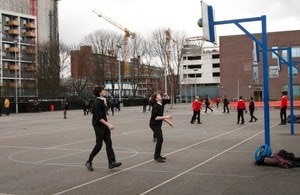How can #EdTech help ‘stuck’ schools in ‘left behind’ areas improve?

Fight or flight? Raising expectations of children and parents, high standards for teachers and tackling bad behaviour
415 schools in England are ‘stuck’ in a cycle of low performance and need better and more tailored support to improve, a new Ofsted report has found.
In Fight or flight? How ‘stuck’ schools are overcoming isolation, Ofsted defines stuck schools as those that have not been judged good or better since September 2006, and have had at least 4 full inspections during that time. Currently, the 415 schools that fall into that definition serve 210,000 pupils but have potentially left 2 whole cohorts of children without a good education.
Stuck schools say that they struggle with a combination of issues: isolation, meaning it’s hard to recruit and keep good teachers; poor parental motivation, meaning children are not encouraged to learn or even attend school at all; and unstable pupil populations, meaning the year groups are constantly disrupted.
However, we found that other stuck schools with all of these issues were able to ‘unstick’ themselves by focusing on a few core areas: high academic standards, getting behaviour right and improving governance.
Stuck schools are typically in deprived areas, where there might have been a decline in traditional industry and a lack of cultural opportunities. They are often in towns or small cities with a neighbouring major city that is more attractive to teachers, and has more jobs and opportunities. Sometimes, they are simply isolated in very remote areas. The 3 areas with the highest proportion of stuck schools are Derby, Southend-on-Sea and Darlington.
Ofsted’s research found that some stuck schools had a deep and embedded school culture, resistant to change, with staff not believing that it was possible to overcome the factors that stood in the way of children receiving a great education. Other schools were chaotic and continually changing. For example, one school had been under the leadership of 14 different headteachers in 10 years.
Stuck schools have been inundated with improvement initiatives from central and local government over the years, few of which have proved successful. By contrast, schools that have improved have been able to identify their specific needs and get support tailored to those needs. It’s clear that identifying what has gone wrong is vital to then getting it right.
Ofsted is well placed to help these stuck schools diagnose the issues through its new inspection framework, and so to help the school and its partners to get on with improving the school. But we also need to increase the depth of diagnosis we give these schools. We are recommending that the government funds Ofsted to trial a longer, deeper inspection approach with some of these schools, with the aim not of passing judgement but of enabling support to improve. We have made good progress with the Department for Education already.
 HM Chief Inspector Amanda Spielman said:
HM Chief Inspector Amanda Spielman said:
“Stuck schools are facing a range of societal problems such as cultural isolation, a jobs market skewed towards big cities and low expectations from parents. However, we have shown that schools in these places can still be good or better by holding teachers to high standards, tackling bad behaviour and getting the right leadership in place. Our inspectors have found that the majority of schools in challenging areas are providing children with a good education that sets them up to succeed in later life.
“What the remaining stuck schools need is tailored, specific and pragmatic advice that suits their circumstances – not a carousel of consultants. They are asking Ofsted to do more to help, and we agree.”
A Department for Education spokesperson said:
“We want every child to benefit from a good education. Whilst 86 per cent of schools are rated good or outstanding, we know there is more to do and we will continue our relentless focus on standards by backing teachers and intervening where there is entrenched underperformance.
“Ofsted plays an invaluable role in improving standards and we are working with them to look at how best to support these schools. We have also created a specialist academy trust to work with these schools and make improvements, as well as six new training hubs to ensure the best leaders can provide support.”
James Grant, Co-Founder & Managing Director, Schools:
“It’s clear that schools and academies need more assistance to help pupils achieve the results they need to get the best start in life. And while Ofsted’s report identifies these stuck schools, more needs to be done to help them find solutions that are effective for their students, teachers and their bottom line.
“By utilising the pupil premium budget, schools can deploy online, one-to-one tutoring programmes that can address the specific needs of the pupil by giving them access to focused, tailored support – which is often difficult to provide in a class of 30. Online solutions like these give isolated schools in remote or rural areas access to a much broader pool of teaching talent not limited by geography, and have proven impact (for example, students using MyTutor last year made an average of a whole grade’s progress over 12 lessons).
“Over the next five years, more and more low achieving schools will adopt EdTech solutions to help their pupil’s attainment and in turn, their own budget.”
ASSERTIONS IN OFSTED REPORT ON THE IMPACT OF UNIONS WIDE OF THE MARK
 Ms Chris Keates, Acting General Secretary of NASUWT – The Teachers’ Union, said:
Ms Chris Keates, Acting General Secretary of NASUWT – The Teachers’ Union, said:
“The report contains many observations that reflect the NASUWT’s experience of the barriers that schools can encounter in their improvement journeys. In particular, as the report notes, schools continue to report that the advice they receive comes from too many quarters; is often contradictory and fails to address the reality of the challenges that they face.
“It is, therefore, disappointing that these important messages are distracted from by the inclusion in the report of unverified assertions by two schools that ‘antagonistic union voice’ had been an obstacle to their progress. Unfortunately, it is sometimes the case that poor employers persist in not seeing the work of trade unions in legitimately representing the concerns of their members as part of the solution to the challenges they face.
“All employers need to recognise the tried and tested principle that providing high quality educational experiences for pupils and securing fair and equitable working conditions for teachers are mutually inclusive goals.
“Working constructively with trade unions is the best way for all schools to secure working conditions for teachers that will help to transform the learning outcomes for pupils.”
 Dr Mary Bousted, Joint General Secretary of the National Education Union, said:
Dr Mary Bousted, Joint General Secretary of the National Education Union, said:
“Ofsted identifies the problem of ‘stuck’ schools but persistently and resolutely fails to recognise its own role in creating the problem.
“As recent EPI research shows, schools in deprived circumstances are much more likely to find it hard to get out of the Ofsted category than schools in leafy suburbs. Ofsted is not the independent and objective arbiter that it’s making itself out to be.
“Fear of Ofsted is a key factor in school leader and teacher flight from these schools. Ofsted judgements routinely fail to recognise the work of schools in challenging areas with deprived pupil intakes. Even when these schools are doing well in terms of pupil progress, Ofsted disproportionately and unfairly awards them negative grades which can end teacher and school leader careers.
“The new inspection framework is not fit for purpose. 54% of the ‘stuck’ schools are either primary or junior, and Ofsted will be aware of NEU’s serious concerns about the ways in which the new framework is ill-suited to that sector.
“Far from being a force for educational improvement in the areas that need it most, Ofsted is, unfortunately part of the problem, not the solution.”

Responses